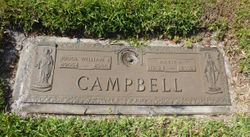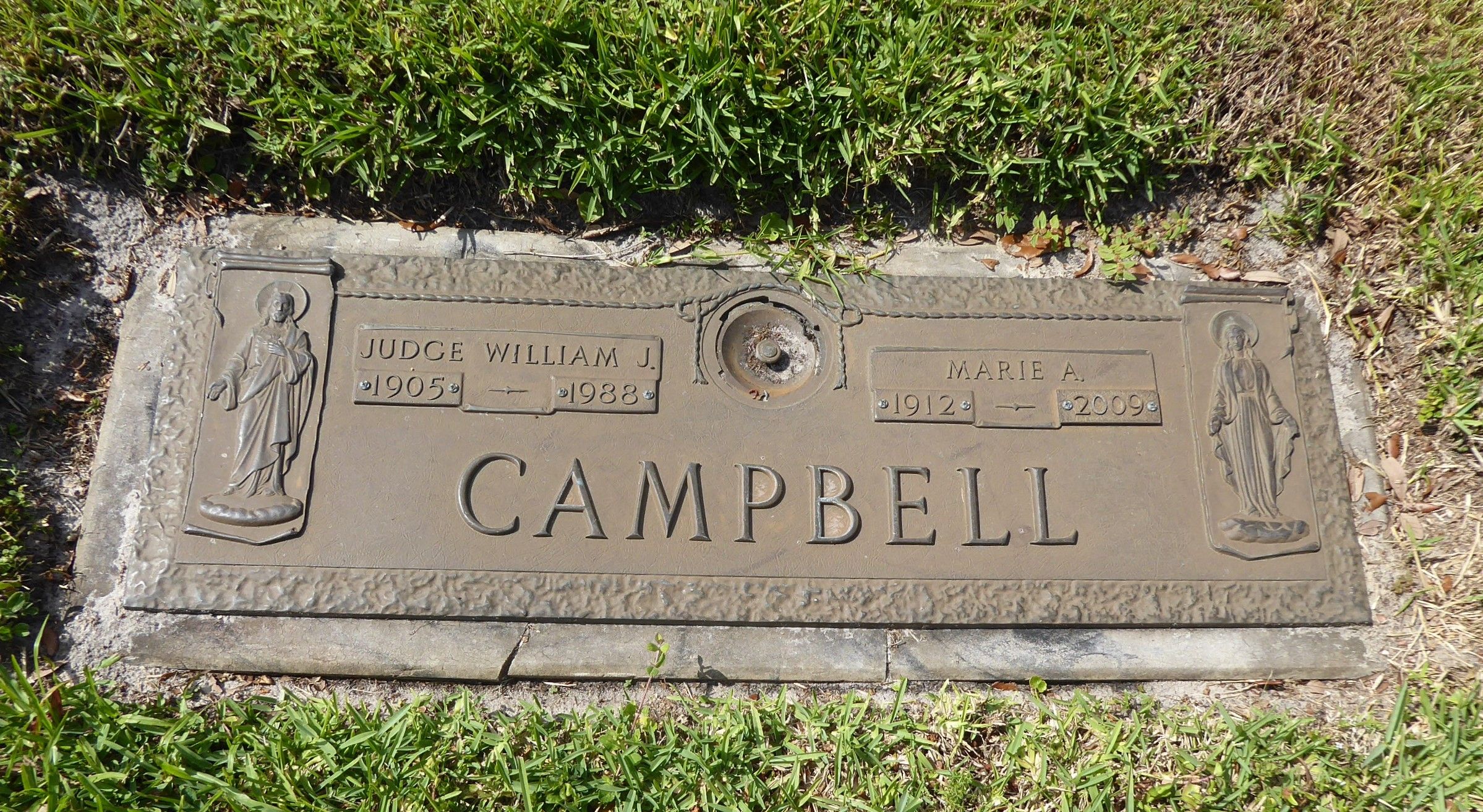Appointed in 1940 to the federal bench in Chicago by Franklin D. Roosevelt, Judge Campbell dealt with mobsters and German spies, sentenced draft evaders during World War II and the Vietnam War, and fought gerrymandering in Illinois legislative districts.
He may have narrowly missed being nominated to the U.S. Supreme Court by Lyndon B. Johnson.
''He was a great man. He was a judge with a very practical frame of mind. He wasn't just an academic,'' said Philip Burlington, a law clerk in West Palm Beach from 1981-1985. ''He knew the law and he knew what the practicalities were. Some judges have one and not the other.''
Judge Campbell came to Palm Beach County in 1977, and began to hear cases here at that time. Technically, he was assigned to the federal appellate court in Chicago, where he traveled twice a year for judicial proceedings.
His calendar here never compared with the high-profile cases he heard in Chicago -- those involving gangster Al Capone, mobster Sam Giancana and publisher Moses Annenberg.
Judge Campbell most liked to recount his dealings with Capone, who had served eight years in prison when he became eligible for parole in 1939.
''I insisted that, as a condition of parole, he never set foot in Cook County, and he agreed to it,'' Judge Campbell said in an interview. ''I also insisted that he pay every last nickel in taxes he owed the government.
''He paid it in legal tender, but it was all pennies -- millions of dollars in pennies.''
Then, spreading a handful of pennies on his desk during the interview in West Palm Beach, Judge Campbell recalled what he told Capone's attorney: ''I told him his client would have to sit in prison until it was all counted. I told him we would let him know in two or three months when we had counted the first million.''
Chicago banks actually verified the total payment in about a day.
Judge Campbell once said a highlight of his career was a World War II treason case, United States vs. Haupt, in which he sentenced two Nazi spies to death and two to life in prison for, among other charges, plotting to poison Chicago's water supply. An appellate court quashed the death sentences.
In 1965, Judge Campbell once recalled, he was in line to receive a Supreme Court nomination. Justice Felix Frankfurter had died. Although Judge Campbell and president Johnson had been friends since the 1930s, Johnson named Abe Fortas to the bench.
''Although I knew Johnson intimately and personally, he was bigoted enough not to appoint two Catholics on the Supreme Court,'' Campbell said in a 1986 interview.
A graduate of St. Rita's College and Loyola University of Chicago, Judge Campbell was admitted to the Illinois Bar in 1927, and was a partner in the law firm of Campbell & Bruns until 1940. He married the former Marie Agnes Cloherty of New York City in 1927.
Roosevelt appointed him as U.S. attorney for the Northern District of Illinois in 1938, primarily to fight the Chicago Democratic political machine. Two years later, Roosevelt appointed Judge Campbell to a federal judgeship.
In 1959, he was named chief judge in the district court in Chicago, and in 1970 was named senior judge.
A co-founder of the Catholic Youth Organization in 1930, Judge Campbell was on the board of trustees of Barat College in Lake Forest, Illinois, and the board of directors of Catholic Charities of the Archdiocese of Chicago. He was named Chicagoan of the Year in 1966 by the Chicago Chamber of Commerce and Industry.
Judge Campbell is survived by his wife, Marie, of Manalapan; five daughters, Marie Campbell Cummings of Chicago, Karen C. Reid of Flossmoor, Illinois, Heather T. Henry of Calais, Vermont, Patti Fazio of Northfield, Illinois, and Roxane Sedlacek; three sons, William J. Campbell Jr. of Lake Park, Illinois, Christian L. Campbell of Western Springs, Illinois, and Thomas J. Campbell of Stanford, California; a brother, John B. Campbell of LaGrange, Illinois; and twenty grandchildren.
Rosary services will be held at 7:30 p.m. today at Quattlebaum-Holleman-Burge Funeral Home in West Palm Beach. A Mass will be said at 10:30 a.m. on Saturday at Holy Spirit Catholic Church in Lantana.
Burial will be at the Queen of Peace Cemetery in West Palm Beach.
Published in the South Florida Sun-Sentinel on October 21, 1988.
Appointed in 1940 to the federal bench in Chicago by Franklin D. Roosevelt, Judge Campbell dealt with mobsters and German spies, sentenced draft evaders during World War II and the Vietnam War, and fought gerrymandering in Illinois legislative districts.
He may have narrowly missed being nominated to the U.S. Supreme Court by Lyndon B. Johnson.
''He was a great man. He was a judge with a very practical frame of mind. He wasn't just an academic,'' said Philip Burlington, a law clerk in West Palm Beach from 1981-1985. ''He knew the law and he knew what the practicalities were. Some judges have one and not the other.''
Judge Campbell came to Palm Beach County in 1977, and began to hear cases here at that time. Technically, he was assigned to the federal appellate court in Chicago, where he traveled twice a year for judicial proceedings.
His calendar here never compared with the high-profile cases he heard in Chicago -- those involving gangster Al Capone, mobster Sam Giancana and publisher Moses Annenberg.
Judge Campbell most liked to recount his dealings with Capone, who had served eight years in prison when he became eligible for parole in 1939.
''I insisted that, as a condition of parole, he never set foot in Cook County, and he agreed to it,'' Judge Campbell said in an interview. ''I also insisted that he pay every last nickel in taxes he owed the government.
''He paid it in legal tender, but it was all pennies -- millions of dollars in pennies.''
Then, spreading a handful of pennies on his desk during the interview in West Palm Beach, Judge Campbell recalled what he told Capone's attorney: ''I told him his client would have to sit in prison until it was all counted. I told him we would let him know in two or three months when we had counted the first million.''
Chicago banks actually verified the total payment in about a day.
Judge Campbell once said a highlight of his career was a World War II treason case, United States vs. Haupt, in which he sentenced two Nazi spies to death and two to life in prison for, among other charges, plotting to poison Chicago's water supply. An appellate court quashed the death sentences.
In 1965, Judge Campbell once recalled, he was in line to receive a Supreme Court nomination. Justice Felix Frankfurter had died. Although Judge Campbell and president Johnson had been friends since the 1930s, Johnson named Abe Fortas to the bench.
''Although I knew Johnson intimately and personally, he was bigoted enough not to appoint two Catholics on the Supreme Court,'' Campbell said in a 1986 interview.
A graduate of St. Rita's College and Loyola University of Chicago, Judge Campbell was admitted to the Illinois Bar in 1927, and was a partner in the law firm of Campbell & Bruns until 1940. He married the former Marie Agnes Cloherty of New York City in 1927.
Roosevelt appointed him as U.S. attorney for the Northern District of Illinois in 1938, primarily to fight the Chicago Democratic political machine. Two years later, Roosevelt appointed Judge Campbell to a federal judgeship.
In 1959, he was named chief judge in the district court in Chicago, and in 1970 was named senior judge.
A co-founder of the Catholic Youth Organization in 1930, Judge Campbell was on the board of trustees of Barat College in Lake Forest, Illinois, and the board of directors of Catholic Charities of the Archdiocese of Chicago. He was named Chicagoan of the Year in 1966 by the Chicago Chamber of Commerce and Industry.
Judge Campbell is survived by his wife, Marie, of Manalapan; five daughters, Marie Campbell Cummings of Chicago, Karen C. Reid of Flossmoor, Illinois, Heather T. Henry of Calais, Vermont, Patti Fazio of Northfield, Illinois, and Roxane Sedlacek; three sons, William J. Campbell Jr. of Lake Park, Illinois, Christian L. Campbell of Western Springs, Illinois, and Thomas J. Campbell of Stanford, California; a brother, John B. Campbell of LaGrange, Illinois; and twenty grandchildren.
Rosary services will be held at 7:30 p.m. today at Quattlebaum-Holleman-Burge Funeral Home in West Palm Beach. A Mass will be said at 10:30 a.m. on Saturday at Holy Spirit Catholic Church in Lantana.
Burial will be at the Queen of Peace Cemetery in West Palm Beach.
Published in the South Florida Sun-Sentinel on October 21, 1988.
Family Members
Sponsored by Ancestry
Advertisement
Explore more
Sponsored by Ancestry
Advertisement



